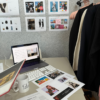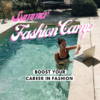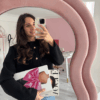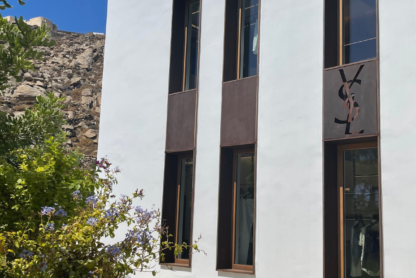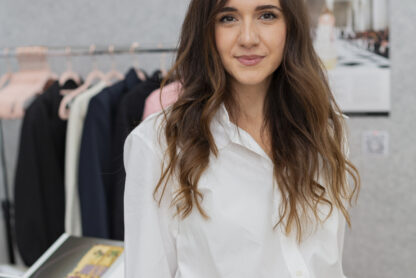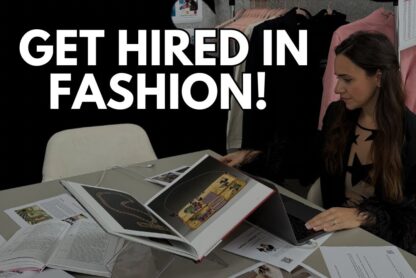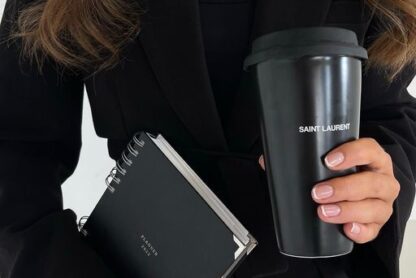Are you willing to know what are the skills you need for a career in fashion?
Maybe you are wondering if without a fashion degree or with work experience in another field, or with no experience at all, you have some specific skills that you can apply to fashion. The short answer is yes!
You might not be aware of it, but you already have many (transferable) skills that can be applied to the fashion industry. Why? Because skills are not solely developed through work experience; they can be acquired through various avenues such as education, personal projects, and even previous jobs in different fields.
Let’s talk about what transferable skills are and how you can use them to convince recruiters that you are the right person for the job.
What Is A Transferable Skill
Transferable skills are abilities you have gained in previous roles, personal experiences, or educationthat can be applied to different industries or positions, including fashion.
Why Are Transferable Skills Important
The fashion industry is looking for a diverse range of talents and expertise, with all kinds of skills. While technical skills specific to fashion can certainly be beneficial, transferable skills play a significant role in bridging the gap between your current experience and your desired career in fashion. These transferable skills can provide a solid foundation upon which you can build and thrive throughout your career path in the fashion industry.
Whether you’re changing jobs, or industries, or even pursuing an entirely different career path, transferable skills play a crucial role in showcasing your potential and suitability for a new role. They make you a versatile candidate, capable of landing a role even if it’s unrelated to what you studied or what your previous position was.
Fashion companies appreciate candidates with a diverse range of talents and expertise, who can bring diverse perspectives and skills to the table and adapt to different tasks and challenges as needed. That’s why the fashion industry hires from other sectors as well such as tech, music etc. They do also hire people without experience who studied different things and not only fashion including business, literature, politics, art, history, psychology, engineering…
For sure, transferring skills can be more or less easy depending on the career you are pursuing. Technical roles in the industry, such as fashion design, pattern making, and “modellista”, require specific skills unique to fashion that you can only acquire with experience in this very field as it’s unlikely that in another industry you learned how to design clothes, (but don’t get discouraged because you can acquire them with some personal projects!. Whilst if you are interested in getting a job in buying, merchandising, pr, marketing, brand management, e-commerce, digital marketing, social media, communication, event organization… so those roles of the industry that don’t require a particular technical skill, rest assured that you already possess a multitude of transferable skills that you have acquired in your education or experience in another field.
Let’s see how you can transfer the skills you acquired at university to the fashion industry.
I studied economics, marketing, literature… what can I do in fashion?
Whether you studied business, marketing, design, or any other discipline, you have likely gained valuable skills that can be transferred to the industry. So even if your work experience lies outside the realms of fashion, you can still leverage your existing skill set and embark on an exciting career in this dynamic field.
I asked on Instagram some days ago to share what you studied so I could show you how your degree can be applied to fashion, and these are some of the examples I shared that I want to report in this article to demonstrate that you already have many skills that can be applied to fashion so you just have to learn how you can highlight these to recruiters in your job applications.
Example 1: I studied business or economics: how can I become a fashion buyer?
If you studied business or economics and you want to become a fashion buyer, you can for sure do it, as these degrees equip you with strong analytical skills. Fashion buying involves analyzing market trends, consumer behavior, sales data, and financial aspects of the industry. Therefore, buyers with a business background can effectively analyze this data to make informed decisions regarding purchasing, pricing, and inventory management.
Example 2: I studied sociology: how can I go into fashion PR?
A sociology degree can offer valuable skills and perspectives that can be beneficial in a fashion PR job. Sociology provides insights into human behavior. This knowledge can be applied to understanding consumer behavior in the fashion industry, including how individuals make purchasing decisions, how fashion trends emerge and spread, and how social influences shape consumer preferences. Understanding these factors can help you develop effective PR strategies and tailor communication efforts to target specific consumer segments.
Example 3: What can I do with my marketing degree?
A marketing degree can be easily transferable to a career in fashion marketing because marketing principles are always the same regardless of the industry. Marketing degrees often teach how to conduct market research and analyze trends and consumer behavior. For instance, you can leverage your knowledge of market research methodologies to gather insights, identify target markets, and develop effective marketing strategies for fashion brands. Marketing degrees also cover topics such as brand management and positioning. In fashion marketing, creating a strong brand identity and positioning a fashion brand effectively is essential. Thus, your understanding of branding strategies, brand development, and creating unique value propositions can be applied to shaping the image and identity of fashion brands.
Example 4: How a management degree can be applied to fashion?
Fashion is not only a creative industry, so if you studied management, you are fully qualified to land any management/marketing/buying/PR position in fashion. Management education emphasizes strategic thinking and decision-making processes and equips you with the ability to plan, execute, and monitor projects, ensuring they are delivered on time and within budget. This skill is valuable across different fashion departments, where you may be involved in developing business strategies, analyzing market trends, working with multiple stakeholders, making critical decisions, and ensuring successful outcomes related to product development, marketing, and resource allocation. Fashion projects, such as runway shows, product launches, and store openings, also require effective project management skills.
Example 5: How to use your experience as sales assistant?
A common experience among students or recent graduates is becoming a sales assistant. Maybe you didn’t consider it but as a sales assistant, you have likely acquired several transferable skills that can be applied to the fashion industry. Here are some ways your experience can be valuable:
Interpersonal Skills: Your experience as a sales assistant means you have developed strong interpersonal skills, and the ability to engage with customers, understand their needs, provide guidance, and deliver a positive shopping experience. These skills are highly transferable to roles in fashion retail, personal shopping, or customer support within fashion brands.
Product Knowledge: Working as a sales assistant requires you to have in-depth knowledge about the products you sell. This includes understanding different styles, fabrics, and sizes. This product knowledge can be useful in fashion-related roles, such as assisting customers with styling advice, recommending suitable garments, or working in a showroom or fashion boutique where detailed knowledge of the products is crucial.
Communication and Persuasion: As a sales assistant, you have likely honed your communication skills and developed the ability to effectively convey information, explain product features, and influence customer purchasing decisions. These skills can be applied in various fashion-related roles.
Retail Operations: Working in a retail environment exposes you to various aspects of retail operations, such as inventory management, visual merchandising, and point-of-sale systems. These skills are transferable to fashion retail positions such as buying and merchandising.
Teamwork and Collaboration: In a sales assistant role, you likely worked closely with colleagues and interacted with various teams within the retail environment. Collaboration and teamwork skills are valuable in the fashion industry, where cross-functional collaboration is essential for product development, marketing campaigns, and retail operations. Your ability to work effectively with others can be beneficial in fashion-related roles that involve teamwork and coordination.
Time Management and Organization: Working in a fast-paced retail environment requires excellent time management and organizational skills. You need to balance multiple tasks, prioritize customer needs, and ensure efficient store operations. These skills can be applied to fashion roles that involve project management, event coordination, or working in fashion production, where meeting deadlines and managing resources is crucial.
Example 6: I studied art history/literature: how can I become a fashion editor or writer?
The great thing about these degrees is that they teach you general culture that is highly appreciated in fashion where you need to have strong knowledge and passion for the industry. Studies in art, literature, or similar field speak of you as a curious person, and they can be resourceful if you want to work in magazines, for example, since they don’t only cover fashion but also art, culture, travels, lifestyle… For example, you could transfer these skills to work as an editor or writer.
Example 7: I studied fashion design but want to do something else
It can also happen that you ask yourself if you have the right skills if you studied fashion but you want to go into a different career than what you studied. Let’s say you studied fashion design and now you want to go into styling. While a fashion design degree may not have a direct focus on styling, it can provide you with valuable skills and knowledge that can be applied to the field of styling. A fashion design degree equips you with a solid understanding of garment construction, including pattern-making, draping, and sewing techniques. This knowledge can be invaluable when working as a stylist, as it allows you to understand how different garments fit and how they can be altered or styled to achieve a desired look. Fashion design programs often cover various types of fabrics, their properties, and how they drape or behave when worn. This understanding of different materials and their characteristics is essential for selecting appropriate garments and fabrics for styling purposes. Fashion design education typically includes coursework on color theory, which helps you understand how different colors work together and how to create harmonious color palettes.
Here’s how your background in costume design and fashion can be useful in a trend forecasting job. Your studies in costume design and fashion have likely provided you with a comprehensive understanding of the industry, including historical fashion trends, design principles, and the evolution of styles over time. This knowledge forms a strong foundation for trend forecasting, as you can analyze past trends and draw connections to current and future fashion movements.
I hope with the examples above you get an idea of how to use your acquired skills to your advantage by transferring them to a new role, and maybe even a completely different field.
Let’s see some transferable skills you already possess that can be applied to fashion.
Transferable Skills Examples
Microsoft Excel
The fashion industry may be all glamorous, but behind all the clothes that you find in stores, amazing campaigns, and any other finished product or service you see, really, there is a team working on Excel spreadsheets every day to organize and analyze the information to make important decisions and build strategies for the brand. From analyzing sales, marketing strategies, and past ready-to-wear collection performances to predicting trends and sales forecasts to managing sample tracking between PRs and stylists, Excel is used to analyze but also to organize all of the fashion work. This is the n#1 skill to work in fashion, so it can be useful in absolutely every career and if you know how to use it, that’s a big win. Make sure to indicate your level of proficiency on your resume to get noticed by recruiters.
Computer Skills
Computer skills are not just for programmers and graphic designers. They are needed in other fields as well, like advertising, art direction, photography, and social media. For any role that involves creating graphics and fashion images, Photoshop, InDesign and Illustrator are must-have skills. And if your job involves writing, add WordPress and SEO writing to the list. It doesn’t matter if you used these programs in another industry and to do different types of tasks in the past. If you know how to use them, you can apply your knowledge of them in the fashion industry as well.
Communication Skills
Effective communication is crucial in any industry, and in fashion, it is essential to successfully bring a fashion product to market. There is written communication, when you have to draft reports, write articles or create posts for social media, and verbal communication which involves presentations and reaching out to different stakeholders, among others. If you have experience in fields such as, but not limited to, sales, marketing, public relations, or customer service, your ability to convey ideas, negotiate, and build relationships will be valuable.
Interpersonal Skills
Having good interpersonal skills can make your job easier in any field, and fashion is no exception. All the collaborations, networking, and teamwork inside a company and beyond its doors happen in part because people show great interpersonal skills. They are important because when you are assigned to a department, you still have to communicate with other departments to gather and exchange information to perform your duties. Designers have to work with merchandisers to develop a collection, PR managers have to talk to the marketing department, and so on. You also need interpersonal skills to develop fruitful relationships with external stakeholders. Therefore, if you are good at interacting with people, don’t underestimate this skill as it can open many doors for you, and don’t hesitate to mention it among your soft skills.
Languages
If you speak several languages, consider yourself lucky because fashion is an international industry and many roles require being in touch with people from different cultures and countries. Most global fashion brands were founded in Italy, France, the U.S., and the U.K., which is where they are still based today, plus they have offices around the world. This is why English, Italian, and French are the most popular languages to speak if you want to work in fashion. Other commonly spoken languages include German, Spanish, and Chinese.
Organizational skills
Organizational and time management skills are the basis of every job well executed, and they show responsibility and guarantee trust from your boss and the whole team. These skills are paramount in fashion, whether you work at the cupboard of a magazine or for a luxury brand that requires you to do many tasks to reach high-quality products or services. You can demonstrate that you are an organized person by providing examples of duties you had at previous jobs (in any field) that required a lot of organization. Or maybe you had to work several jobs on the side of your studies, or you were participating in many activities while studying? This also tells a lot about your ability to organize your daily routine and projects.
Attention to detail
This skill is important in an industry like fashion that cares about its image, aesthetics, and quality. Attention to detail is especially if you want to work with luxury brands, as they strive for excellence and provide each product and service at high standards. Therefore, it is important to provide a complete, luxurious experience for the customer so that they don’t find an unpleasant even minor error in the product, its packaging, on the website, etc. that would make their experience worse, which consequently would negatively affect the brand’s reputation. Attention to detail is something not difficult to show. A resume can tell a lot about it, in fact. If it has no typos or errors, you will appear as a quality-oriented person. You can also demonstrate this skill by writing a typo-free and grammatically correct article, or by creating some aesthetic posts for social media.
Project Management
Knowing about project management can help you in many roles, especially if you are looking for a job in fashion management, assisting an e-commerce specialist, brand manager, or product developer, for example. If you studied project management in any field, or you worked as a project manager, you can confidently list management skills when applying to a job in fashion.
Creativity
If you happen to be a creative person by heart, and someone innovative and who thinks outside the box, this can open many career possibilities for you. Creativity can come in many ways. You can be creative artistically in retouching photos, designing a new product, or styling amazing outfits, but you can also be considered a creative person if you are capable of always coming up with new ideas or brainstorming new projects for the company. So there are many ways to show your creativity to recruiters. The best way to do so is through a portfolio, as showing in practice what you can do is better than just stating it as a fact 😉
Writing
Having good writing skills is not only reserved for fashion writers, but for anyone who needs to communicate by writing in their job. PR managers need to write press releases, and sustainability managers write environmental policies and programs. In addition, in any job, you may be involved to draft a report once in a while, and even though it may sound like an easy task, trust me, being able to write it in a concise and clear manner is a skill.
Problem-Solving
Throughout your career path, you are very likely to have to solve problems of all kinds. So if you have experience in analyzing complex situations, and finding innovative solutions, you can apply problem-solving skills to address challenges in areas like supply chain management, retail operations, product development, or any other field, really.
As you can see, transferable skills comprise both hard and soft skills. They are equally important and valued by employers. Hard skills are not reserved for one specific industry or role only, and soft skills are not only important in your personal life, but they are treasured in the professional world as well.
Where should you add these skills?
When you identify your transferable skills, it’s essential to highlight them in your job application. Use the resume and cover letter to emphasize how these skills can be directly applied to the fashion industry and demonstrate your enthusiasm for pursuing a career in fashion.
On your resume
You have two options to indicate the skills on your resume. The first option is to list them in bullet points in the skills section, starting with the most required skills for the position (you can find them in the job description). The second option is to mention them under each of your previous experiences. By listing the tasks that you did, it suggests that you master specific skills. For example, if you say that you were responsible of doing many presentations, it implies that you may have developed good communication skills. Or if you were involved in many different tasks as a volunteer at a fashion show, it suggests that you are a hands-on, organized person who is capable of multitasking. Another way of proving your transferrable skills is to insist on the results you achieved at your previous job or internship and actually state what skills you developed. For instance: “During my time as an social media manager at X brand, the number of followers grew up from 100 K to 150 K in 6 months” This implies you are good at growing a brand’s exposure on social media. Read this article to learn how to make a resume with no experience.
On your cover letter
When writing a cover letter for a job in the fashion industry, it’s essential to highlight your transferable skills that are relevant to the field. Like I always say, your cover letter is your chance to tell companies why you are the perfect candidate for that specific job (please don’t write generic cover letters). While your resume is just a schematic list of your skills, with the cover letter you have the chance to actually turn those skills into narrative stories and explain how they are useful for the job you are applying for in that moment.
Here’s how you can effectively use transferable skills in your resume or cover letter to increase your chances of getting a job in fashion:
- Research the Job Requirements: Start by thoroughly understanding the job description and the specific skills and qualifications the employer is seeking. Identify the key skills required for the fashion position you’re applying for.
- Identify Your Transferable Skills: Review your previous experiences, including your education, internships, volunteer work, or other jobs, and identify the skills that align with the requirements of the fashion industry.
- Clearly explain how your transferable skills can be applied to the fashion industry. For instance, if you have experience in visual merchandising, explain how your attention to detail and creativity helped you curate appealing product displays.
Remember: you don’t have to include every single transferrable skill you acquired in your life, otherwise it will be counterproductive, as the employer may think you are trying to fill up your application with unnecessary information and you are incapable of filtering what’s useful for the position and what’s not. If you mention even a few transferable skills and clearly explain how they can be useful for the job you are applying for, this will already show your value and potential.
We hope that after reading this article, you got a significant dose of motivation to pursue the fashion job of your dreams no matter your background, and you realize you have so much to offer to the industry with your powerful set of transferable skills.
